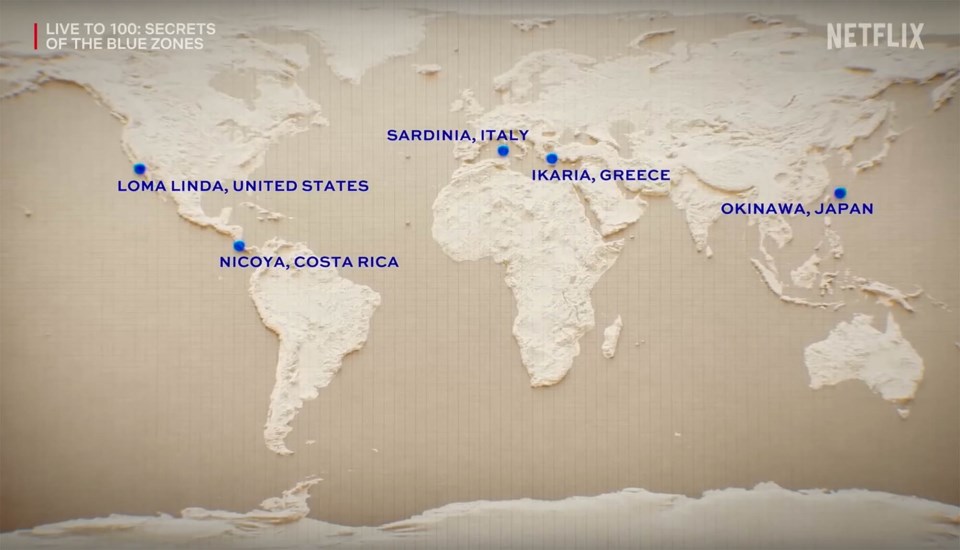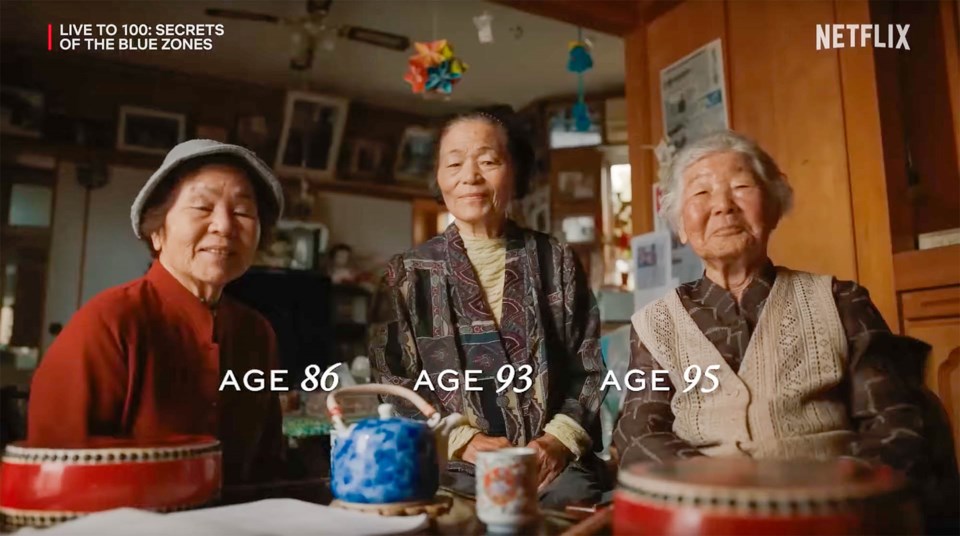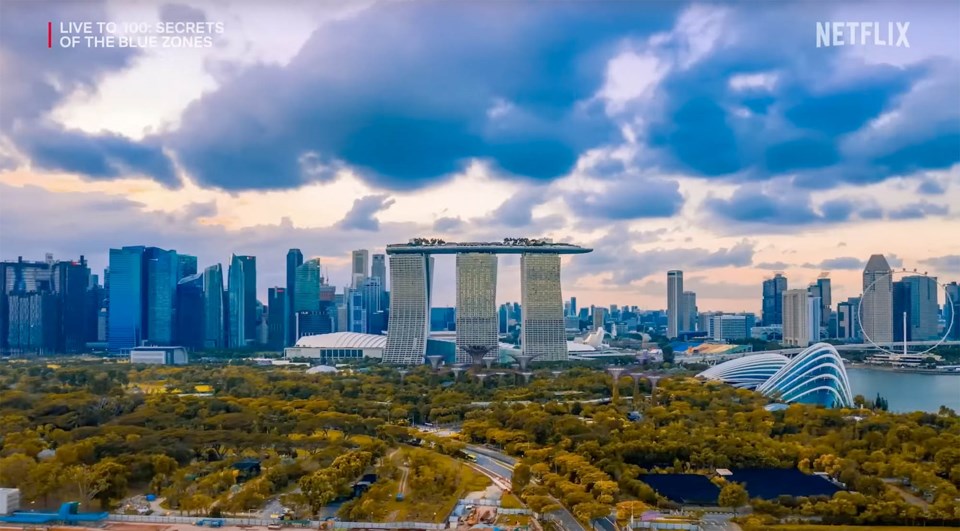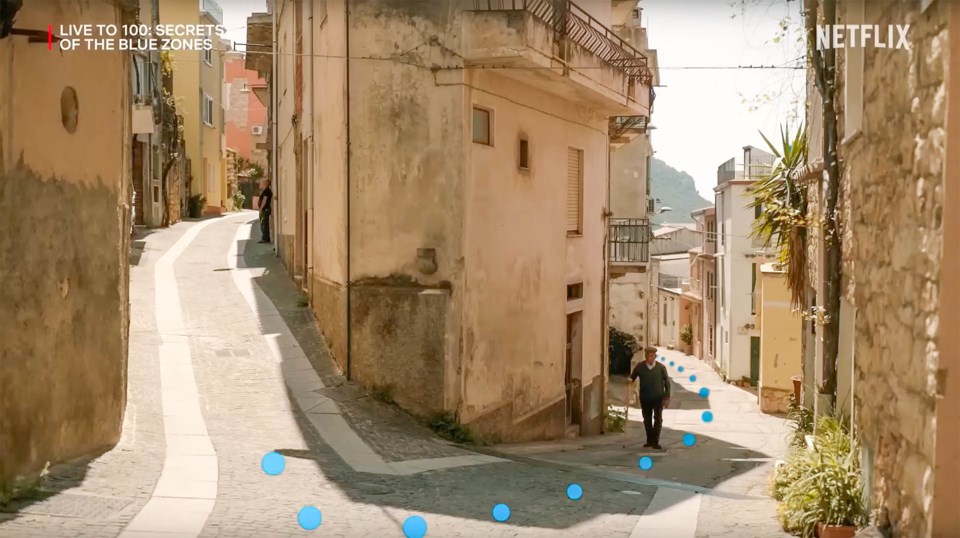If ever there is a door worth opening, Live to 100: Secrets of the Blue Zones is it. Forget parsing Midnight Sun or resurrecting Anna Karenina at book club this month. Instead view this recent (2023), thought-provoking Netflix documentary series with your group, twice, then critique it.
For those not familiar with its creator Dan Buettner, he is a National Geographic Fellow and bestselling author who has studied aspects of longevity for decades, and identified regions where the world’s highest concentrations of centenarians live, naming them “Blue Zones.” Throughout the series Buettner and expert guests develop theories regarding which factors contribute to long life and happiness, while providing interesting travelogue-type destination photography. The final episode includes Buettner’s practical efforts with municipal governments, non-profits and insurance companies to enhance longevity and life quality in nine states and 40 communities. (Buettner’s books are available at Pelham libraries.)
Buettner’s documentary presents his longevity-related physical and mental health information without a lot of know-it-all finger-wagging, helping sustain our interest without making us feel defensive or provoking a reach for the mouse or remote. Blue Zones isn’t just for relatively well-off G20-based seniors hoping to prise a few additional years out of their tired old bones and brains. The series offers lifestyle models with relevance for all ages that may not be available elsewhere.

Buettner develops unique yet related arguments and examples of each Zone’s contribution to longevity, then summarizes them into four categories:
First, move naturally: Work by hand, garden, walk.
Second, outlook: Unwind, faith, purpose.
Third, eat wisely: Plant-based for the most part, wine, moderate portions.
Fourth, connect: With family, with a partner, with the right tribe.
For the uninitiated, findings and theories are explained clearly and simply. For those who believe lifestyle and diet choices impact their health, the show is reinforcing. Those who strive to live Buettner’s four pillars can test if they are in fact walking the talk.
Now watch it again critically. To whom does Buettner’s message apply—each of us personally, specific cultures, or society in general? How much of his philosophy is actionable? Is there any hope of achieving what he suggests in our hyper-integrated digital world filled with perpetually barking, profit motivated social media? Should we care?
During the first episode, set in Okinawa, Buettner highlights the importance of living a serene life, stressing “moai,” a strong social network, and “ikigai,” maintaining a sense of purpose or mission.

Is it realistic to think this type of serene life exists today? Is our striving—first as young families, then as middle-aged career-driven adults—to ensure financial security in retirement wrong? Is Buettner suggesting that we change our lifestyle when we retire, or that we attempt to live moai and ikigai throughout our lives? The cliché, “It’s hard to drain the swamp when you’re up to your ass in alligators,” comes to mind.
Buettner states that 73 percent of Americans are obese or overweight (65 percent in Canada), and although a daily intake of 2000 calories will keep us healthy, we consume 3600. In his search for why, he interviews Marion Nestle, Professor of Food Studies and Public Health, New York University.
“In the early 1970s,” Nestle explains, “the Secretary of Agriculture said we need to produce more food to feed the world. From 1980 to 2000 the number of calories available per individual rose to 4000, and the food industry had to sell the surplus.”
Buettner adds, “If you’re overweight and unhealthy in America it’s probably not your fault. Ease and access, we’re a product of our environment.”
I was incredulous. It’s so easy to blame somebody else. Don’t we make our own choices? No one forces us to eat too much, do they?
Apparently they do. The food industry increased portion sizes, added colours, textures and tastes — think salt and sugar — all so we “unwittingly” consume more calories than our bodies require.
The episodes continue. In Sardinia, Italy’s Blue Zone, where the proportional number of centenarians is ten times that of the United States, longevity is primarily attributed to a mostly vegetarian diet, stress-free occupations such as shepherding, living in villages on hillsides which demand additional physical activity to negotiate, and an absence of nursing homes, so seniors aren’t isolated.
Buettner notes, “One of the quickest ways to take life expectancy away from your parents is to put them in a retirement home. The moment they go into a retirement home they lose two to six years.” Stress-free work is achieved because Sardinians have, “kept out the corrosive forces of modernization.”
One of the quickest ways to take life expectancy away from your parents is to put them in a retirement home
My first thought was whether “modernization” includes Covid vaccines, but a search of deaths per 100,000 population showed Italy ranked 20th, behind both Canada and the United States. That was unexpected. Please open me another can of worms if you don’t mind.
The large Seventh Day Adventist Church population in Loma Linda, California, attribute their longevity to their religious lifestyle.
“People who attend spiritual sanctuary two or more times per week get an extra seven years,” asserts Buettner. Healthy lifestyle routines are integral to the Adventist faith, and peer pressure helps devotees stick to their regimens of diet, volunteerism and joy.
“Healthy behaviours are contagious,” he continues. “If your three best friends are obese, you will be too. The same applies to smoking and loneliness. You need to be in the right tribe.”
I get the principle, but is there a more charged descriptor today than “tribalism”?
In Ikaria, Greece, it’s about an ancient bacteria in the wine, lots of joyful dancing and committed relationships.
Of Nicoya, the poorest region in Costa Rica, Buettner states, “People would never do a couple extra hours of work when they could be enjoying their family or taking a siesta.”
Buettner understands that his audience, whether Netflix viewers or councillors and town planners in front of his lectern, will want answers that work in today’s urban environments. He acknowledges that in the last 20 years Okinawa has evolved to now have one of the highest obesity rates in the world, and that life expectancy in rural Ikaria and Sardinia is dropping significantly as exposure to consumerism increases.
Buettner offers Singapore, a “man-made” city of 5.8 million, as an answer. Singaporeans pay $100,000 for the right to drive cars and consequently only 11 percent of its residents own vehicles, hence they get more exercise. Exercise parks and common spaces are mandated by law. Government regulations abound to prevent diabetes, including limiting the amount of sugar in drinks. Adult children are subsidized to reside close to their parents via Proximity Grants, facilitating caregiving. Is Singapore scalable? Does our society have the vision, desire, strength and finances to adopt such policies, and would we be willing to sacrifice so many freedoms for the purported benefits?

If you’re a Wordle, Sudoku or Word Search fan, until Brock’s Professor Newman Sze perfects his team’s isoDGR-mAb anti-aging antibody consider shifting some of that time to viewing Live to 100: Secrets of the Blue Zones. Wrestling to sequence letters and numbers is beneficial fun— wrestling with the cultural, societal and personal value questions that Blue Zones proffers will be a different challenge. It’s never about the answers, it’s always about the questions.



